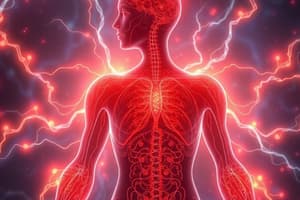Podcast
Questions and Answers
What is the frequency range of genetic defects related to the function of pancreatic beta cells?
What is the frequency range of genetic defects related to the function of pancreatic beta cells?
- 1% to 10%
- Less than 1% to 28% (correct)
- 20% to 50%
- 10% to 20%
What percentage of gestational diabetes mellitus (GDM) patients may develop Type 2 diabetes mellitus later in life?
What percentage of gestational diabetes mellitus (GDM) patients may develop Type 2 diabetes mellitus later in life?
- 25%
- 10%
- 40% (correct)
- 50%
Which of the following tests is considered the screening test for diabetes?
Which of the following tests is considered the screening test for diabetes?
- Fasting blood glucose (correct)
- Random blood glucose test
- Oral glucose tolerance test (OGTT)
- Hemoglobin A1c test
What does the oral glucose tolerance test (OGTT) require in terms of patient preparation?
What does the oral glucose tolerance test (OGTT) require in terms of patient preparation?
Which of the following is a potential cause of diabetes not associated with genetic defects or the pancreas?
Which of the following is a potential cause of diabetes not associated with genetic defects or the pancreas?
What is the primary energy source for the brain and red blood cells?
What is the primary energy source for the brain and red blood cells?
What happens when blood glucose levels exceed the renal threshold?
What happens when blood glucose levels exceed the renal threshold?
What physiological change occurs when glucose is not readily available?
What physiological change occurs when glucose is not readily available?
At what fasting blood glucose (FPG) level is a person generally considered non-diabetic?
At what fasting blood glucose (FPG) level is a person generally considered non-diabetic?
Which hormone is responsible for decreasing blood glucose levels post-meal?
Which hormone is responsible for decreasing blood glucose levels post-meal?
What is an important factor affecting fasting blood glucose (FPG) levels?
What is an important factor affecting fasting blood glucose (FPG) levels?
Which of the following tissues primarily utilizes glycogen and blood glucose for energy during heavy exercise?
Which of the following tissues primarily utilizes glycogen and blood glucose for energy during heavy exercise?
What condition is caused by low blood glucose levels impairing brain function?
What condition is caused by low blood glucose levels impairing brain function?
What is a primary characteristic of Type 1 diabetes?
What is a primary characteristic of Type 1 diabetes?
Which factors are primarily associated with the development of Type 2 diabetes?
Which factors are primarily associated with the development of Type 2 diabetes?
What distinguishes gestational diabetes from other types of diabetes?
What distinguishes gestational diabetes from other types of diabetes?
Which of the following statements is true regarding Type 2 diabetes management?
Which of the following statements is true regarding Type 2 diabetes management?
What condition can result from the metabolism of fat in diabetes?
What condition can result from the metabolism of fat in diabetes?
What is a common consequence of Type 1 diabetes if untreated?
What is a common consequence of Type 1 diabetes if untreated?
Which hormone is primarily responsible for increasing blood glucose levels during fasting?
Which hormone is primarily responsible for increasing blood glucose levels during fasting?
How does the onset of Type 2 diabetes typically present?
How does the onset of Type 2 diabetes typically present?
What percentage of diabetes cases is classified as Type 2?
What percentage of diabetes cases is classified as Type 2?
What is the main cause of Type 1 diabetes mellitus?
What is the main cause of Type 1 diabetes mellitus?
Which of the following hormones does NOT contribute to raising blood glucose levels?
Which of the following hormones does NOT contribute to raising blood glucose levels?
What condition is characterized by hyperglycemia due to insufficient insulin action?
What condition is characterized by hyperglycemia due to insufficient insulin action?
During which state does insulin predominate and help regulate blood glucose levels?
During which state does insulin predominate and help regulate blood glucose levels?
What hormonal effect occurs mainly in a fasting state to maintain blood glucose levels?
What hormonal effect occurs mainly in a fasting state to maintain blood glucose levels?
What is the role of insulin in glycogen synthesis?
What is the role of insulin in glycogen synthesis?
Which of the following can lead to the condition of hyperglycemia?
Which of the following can lead to the condition of hyperglycemia?
What is the main purpose of measuring glycated hemoglobin (HbA1c) levels?
What is the main purpose of measuring glycated hemoglobin (HbA1c) levels?
What percentage of hemoglobin A (HbA) is composed of minor components that are glycated?
What percentage of hemoglobin A (HbA) is composed of minor components that are glycated?
How does glucose concentration in the blood relate to HbA1c levels?
How does glucose concentration in the blood relate to HbA1c levels?
What is a significant early indicator of diabetic kidney damage?
What is a significant early indicator of diabetic kidney damage?
Which of the following methods can be used to measure blood glucose levels?
Which of the following methods can be used to measure blood glucose levels?
Which statement about HbA1c levels is true?
Which statement about HbA1c levels is true?
In non-diabetics, which of the following parameters is typically true about HbA1c levels?
In non-diabetics, which of the following parameters is typically true about HbA1c levels?
What is the role of hemoglobin A1c (HbA1c) in diabetes management?
What is the role of hemoglobin A1c (HbA1c) in diabetes management?
Flashcards are hidden until you start studying
Study Notes
Glucose Importance
- Glucose is a crucial simple sugar found in dietary carbohydrates.
- The body can also synthesize it from protein or triglycerides.
- Glucose is stored as glycogen in the liver.
- All tissues use glucose for energy, biosynthesis of amino acids, lipids, and nucleic acids.
- Skeletal muscle uses glycogen and blood glucose for energy during strenuous exercise.
- The brain and red blood cells almost entirely depend on glucose for energy; low blood glucose impairs brain function.
- Fasting blood glucose (FPG) for non-diabetics is between 3.9 – 5.6 mmol/L.
- When blood glucose exceeds the renal threshold (around 10 mmol/L), glucose spills into urine (glycosuria).
- The body metabolizes fat for energy when glucose is unavailable, leading to ketone production and ketoacidosis.
Regulation of Blood Glucose
- Insulin is produced by beta cells in the pancreas after meals.
- Stimulates glucose uptake from blood into liver and muscle.
- Decreases blood glucose levels.
- Synthesizes glycogen in the liver and muscle for storage.
- Inhibits glucagon release.
- Glucagon is produced by alpha cells in the pancreas and increases blood glucose levels during fasting.
- Stimulates liver glycogenolysis (breakdown of liver glycogen to release glucose into the bloodstream).
- Stimulates gluconeogenesis (formation of glucose from lactate, amino acids, and fat) to maintain blood glucose levels.
- Other hormones that increase blood glucose: growth hormone (GH), adrenaline, cortisol, adrenocorticotropichormone (ACTH), and thyroid hormones.
Hyperglycemia
- Hyperglycemia (increased blood glucose concentration) is a common carbohydrate metabolism disorder.
- Diabetes mellitus (DM): A metabolic disorder characterized by hyperglycemia due to problems making or using insulin.
- Endocrine disorders: Increased levels of growth hormone (GH), adrenaline, cortisol, thyroid hormones, and adrenocorticotropichormone (ACTH) can cause hyperglycemia.
- Medication: Glucocorticoids (corticosteroids) used for allergic, inflammatory, and autoimmune disorders can lead to hyperglycemia.
- Prolonged stress: Increased stress hormones (prolactin, cortisol, adrenaline) can cause hyperglycemia.
Diabetes Mellitus (DM)
- Type 1 DM (Insulin-dependent Diabetes Mellitus or Juvenile Onset DM):
- 5% to 10% of DM cases.
- Caused by an autoimmune disease that destroys beta cells, resulting in a complete lack of insulin.
- Associated with histocompatibility leukocyte antigen (HLA) in 40-50% of familial type 1 DM.
- Some individuals have increased islet cell antibodies and insulin antibodies.
- Some cases may be triggered by an infectious agent (e.g., enteroviruses).
- Requires lifelong treatment with insulin injections.
- Characterized by an acute onset.
- Mainly affects children and young adults.
- Insulin-dependent.
- Fat metabolism causes ketoacidosis, potentially leading to coma.
- Type 2 DM (Previously Non-Insulin Dependent Diabetes Mellitus):
- 90% of DM cases.
- Caused by progressive loss of beta cell insulin secretion and/or insulin resistance (body cells are unable to respond effectively to insulin).
- Associated with sedentary lifestyles, obesity, diet, and polygenic factors.
- Presents insidiously (gradual and subtle).
- Primarily affects middle-aged and elderly individuals.
- Management includes oral hypoglycemic drugs (metformin, sulfonylurea, insulin) and lifestyle modifications (exercise and diet control).
- Gestational Diabetes Mellitus (GDM):
- Defined as any degree of glucose intolerance during pregnancy.
- Affects both mother and baby.
- Most patients return to normal glucose levels after delivery.
- Frequency ranges from less than 1% to 28%.
- 40% of GDM patients may develop Type 2 DM later in life.
Diagnostic Tests for Diabetes
- Fasting Blood Glucose:
- Blood sample taken after a specific fasting period (e.g., 8 hours).
- Convenient screening test.
- Oral Glucose Tolerance Test (OGTT):
- Procedure: Patient fasts overnight (8 hours), then receives a glucose load (g anhydrous glucose dissolved in water). Blood is drawn for glucose measurement at 0, 1, and 2 hours.
- Time-consuming.
- Laboratory Tests for Diabetic Monitoring and Management:
- Glycated Hemoglobin (HbA1c): Reflects average glucose levels over the lifespan of red blood cells (2-12 weeks).
- Urinary Albumin Excretion (Microalbumin): Early indicator of diabetic kidney damage (nephropathy).
- Glycated Albumin: A less commonly used test that provides a shorter-term picture of glucose control.
Glycated Hemoglobin (HbA1c)
- Hemoglobin: Oxygen-carrying pigment giving blood its red color.
- HbA1c: A minor component of hemoglobin with bound glucose (glycated).
- HbA1c levels correlate with blood glucose concentration. Higher glucose levels lead to higher HbA1c levels.
- HbA1c is not influenced by daily blood glucose fluctuations and reflects average glucose levels over the lifespan of red blood cells (2-12 weeks).
- HbA1c serves as a useful indicator of long-term blood glucose levels in the recent past (2-12 weeks) and is used to monitor the effectiveness of diet, exercise, and drug treatment.
- In non-diabetics, HbA1c levels are typically lower.
Correlation Between HbA1c and Fasting Blood Glucose
- HbA1c levels correlate with fasting blood glucose levels, particularly in Type 2 DM patients.
- HbA1c provides a longer-term perspective on glucose control compared to single-point fasting blood glucose tests.
References
- American Diabetes Association. Diagnosis and classification of diabetes mellitus. Diabetes Care S81–90.
Studying That Suits You
Use AI to generate personalized quizzes and flashcards to suit your learning preferences.




